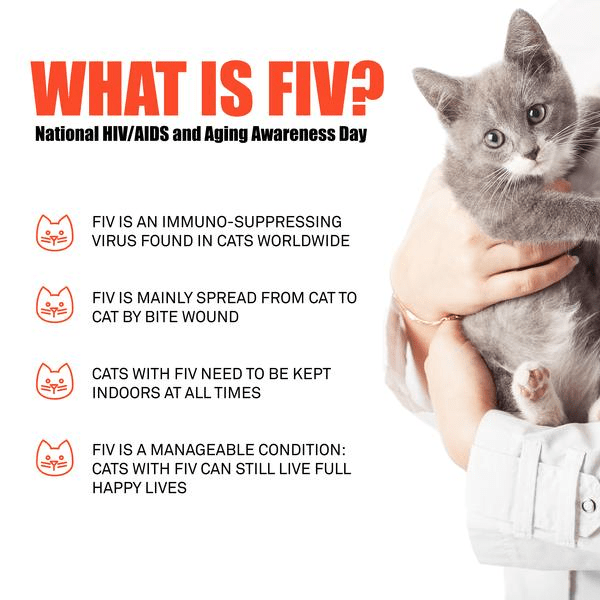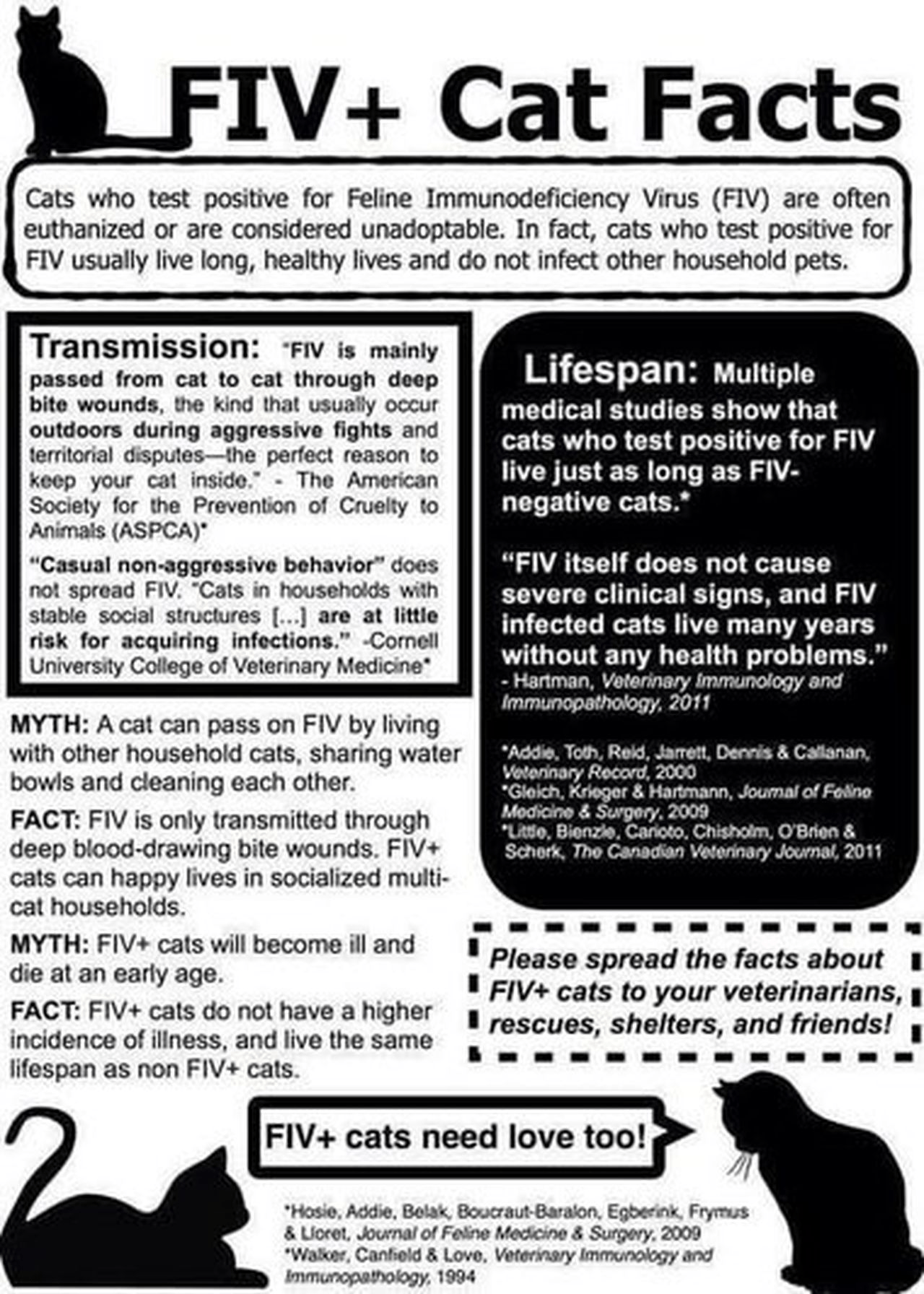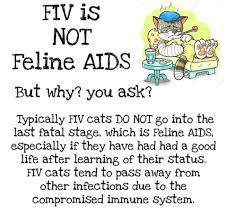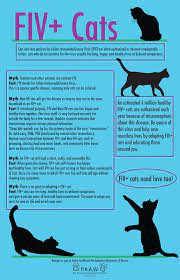From Fivcatrescue.org
FIV is a lentivirus, a slow-progressing virus that can compromise a cat’s immune system, reducing its ability to fight off illnesses. The virus has a long latent period then progresses so slowly that it may never affect a cat. That’s why long-term studies show what guardians and rescuers have known for decades—that FIV cats can live just as long and as healthy, and ultimately die of the same causes as Non-FIV cats. And, FIV cats can live with Non-FIV cats without spreading the virus.
FIV is a rare virus affecting an estimated 2-3% of cats in the U.S. and 3-4% worldwide. For healthy, domesticated, indoor cats, the percentage is even lower.
FIV is difficult to spread. The virus is fragile and does not survive long in the environment. It is killed by air, light, heat and regular household disinfectants.
FIV is primarily transmitted through a deep, penetrating bite (FIV cat to Non-FIV cat) where the virus (in the saliva) is injected directly into the bloodstream of the Non-FIV cat. Bites of this kind are extremely rare, except in free-roaming, un-neutered tomcats.
It can also be spread through blood transfusions (very rare since a Veterinarian would not use an FIV cat to give blood to a Non-FIV cat). Kittens rarely get it from their mothers. Some inherit their Mom’s antibodies (the good guys that fight the virus) so kittens testing positive should be retested between 6 and 8 months of age, at which time most will test negative. Which means they never had the virus, just the antibodies from Mom.
FIV is not passed through open wounds. And, FIV is not passed casually such as the sharing of food or water dishes or toys, mutual grooming, snuggling, mock fighting, shared litter boxes, scratches, not even sneezes. You can cuddle FIV and Non-FIV cats at the same time and not spread the virus.
Yes, FIV cats can live with both FIV and Non-FIV cats without spreading the virus as long as all are non-aggressive. This is usually a matter of introducing cats SLOWLY. Any time a new cat is added to a household, there should be a slow introductory period whether cats are FIV or Non-FIV.



NO. FIV is a feline disease. There is no evidence FIV can be transmitted to humans or other mammals.
A simple blood test called ELISA looks for antibodies to FIV. However, due to many false results, if a cat tests positive, it should be retested using an IDEXX PCR test. (The PCR looks for the actual virus itself.)
No. There are actually no cures for any of the thousands of viruses in cats or humans, and no specific treatments for FIV except good care. (see below: Do FIV cats need special Care?)
A vaccine was created. However, it is no longer available in the US because it did not work for all strains of the virus. Also, the screening tests cannot tell the difference between a vaccinated cat and one that has the virus. So if a vaccinated cat was lost and ended up at a shelter, the cat could lose its life because some shelters routinely “euthanize” FIV cats as unadoptable. (Thankfully, more people running shelters now know that FIV cats are just cats and they are finding homes for them.)


Some people, including veterinarians, still use the misleading terminology that FIV=Feline AIDS. The facts are that FIV is NOT “Feline AIDS.” (Just as we have learned that HIV is NOT “AIDS” in people.) FIV is a slow-progressing virus that could (though rarely does) allow a disease to progress unchecked.
Several long-term studies show what guardians and rescuers have known for decades, that cats can live as long, and as healthy as non-FIV cats and ultimately die of the same causes.
FIV cats have the same needs as Non-FIV cats. ALL cats should be neutered, live only with other non-aggressive cats, kept as healthy as possible, live in a safe environment (either indoor and/or outdoor cat- proofed area), stress levels kept down (all cats are hypersensitive), a quality diet (the best you can afford), regular vet exams, treat any health problems when they arise. And LOVE.
FACT:
The ELISA Test (aka Snap)—used by virtually all shelters and vet offices—looks for antibodies to the FIV virus, not the presence of the actual virus.
In the case of kittens under 6-months of age, a ‘positive’ result can mean the kitten has inherited antibodies from it’s mother —not that it has—a virus. These inherited antibodies usually go away by 6 months. Meaning they never had FIV to begin with.
The darker side of testing is the existence of ‘false positives’ (test errors). False-positives are when the test show a cat as positive for FIV but they are not. Many shelters, unaware of these test errors, use these tests results and label a cat as ‘FIV’ which in some shelter means a death sentence. Estimates of the magnitude of this travesty range from 20% to 32%.*
But the problem is bigger yet. That statistic applies to adult cats; errors in measuring kittens is far higher.
One final problem is that cats who were inoculated against the virus — upon Vet advice that was valid 10 years ago — now produces the identical test result: a positive for FIV antibodies. For many shelters this means yet another kill order is needlessly issued.
This flawed test (ELISA aka SNAP) has been used to justify thousands of deaths a year.
FACT:
FIV is not a deadly virus. FIV is not Feline AIDS. (See Myth #2).
Over and over we shall see this: Most cats with so-called “Advanced cases of FIV” are indistinguishable from cats with normal aging symptoms. So why the rush to kill?
* “Our recent study found 32% of FIV Snap @ ELISA positive tests were negative by our WB [Western Blot Test].” Published by National Veterinary Laboratory, an IDEXX competitor.
FACT:
FIV+ cats with homes can and DO live long, healthy normal lives … when given the chance.
Statistically, most FIV cats* live as long as their indoor counterparts (13-18 years), and much longer, in fact, than cats that live outdoors (3-8 years). There are many reported cases where FIV+ cats live well into old age without ever showing any symptoms.
Typical causes of death are geriatric.
In short, if misguided people did not kill them for no good reason, the cats would likely live a full healthy life.
“FIV positive” is just a diagnosis (a not-so-educated guess) that someday a problem might develop.
Cat AIDS (more accurately called Feline AIDS) is claimed to be the 4th and final stage of FIV by researchers. Those researchers also agree that most cats never reach that stage.
Query: what do you call a “disease stage” that is seldom reached, takes over a decade, and is better explained by other forces (i.e. Aging)?
Answers: Illusory Correlation and Confirmation Bias are both good choices. (Google if you are curious). The process itself is a classic case of a logical fallacy known by its Latin name “Post hoc ergo propter hoc.”
To demonstrate the lack of logic of this type of thinking, many cats die of cancer. Does that mean that cancer was lurking in the cat’s system for many years, waiting for its “stage” to appear? Hardly.
Why not claim that cancer is the Final stage of FIV, since it is a statistically more likely event?
To translate the Latin above [and remove the fallacy part]: After the fact does not mean there is any causal relationship. After the fact means 1 thing: event 2 occurred after event 1. NOTHING ELSE!
Most FIV cats die of old age diseases. PERIOD.
Most FIV cats live relatively healthy lives. PERIOD.
Those who claim otherwise need to bring their knowledge up to date.
It is impossible to predict the long-term outlook for any particular cat diagnosed as FIV, just as it is with a Non-FIV cat. As we mentioned earlier, the asymptomatic ‘stage’ can, and usually does, extend for many, many years.
Research has yet to document any shortening of life from FIV. Only the statistically rare disease Feline AIDS causes a demonstrable loss of longevity.
With modern advances in veterinary care, along with some holistic,natural strategies that pet guardians have been quietly testing for the last 2 decades, even if the cat does develop Feline AIDS, there are still options!
*Above references are to non-feral cats. Feral cats are difficult to track, are habitually malnourished, rarely receive any medical treatment, and have a multitude of other environmental challenges.
FACT:
In the first place, FIV is species-specific. The “F” in FIV stands for Feline. It does not stand for Fido or Family. Okay?
Dogs, other pets, and humans are absolutely immune.
The virus itself is astonishingly frail. It can live outside of the body for only a few seconds. The virus is extremely slow acting.
Modern research indicates that transmission requires serious physical interaction.
“Deep bite wounds are, by far, the primary mode of the virus’ transmission.” Dr. Julie Levy, DVM, PhD (confirmed by several other researchers).
Normal social interactions between FIV and Non-FIV cats, such as grooming, sharing food and water bowls, and community litter boxes have no known risk of transmission.
FACT:
If a mother cat has FIV antibodies, her kittens have a good chance of possessing them … at birth. Some Shelters do not even bother with the formality of a test – if mom tests positive, all are summarily executed.
I pause for the stunning stupidity of that Shelter policy to sink in.
Oh, but the picture is far worse. As any trained feline professional should know, birth transmitted antibodies are rare!
And the coup de gras (unfortunately delivered by those more deserving of receiving than giving) is this: even if momentarily present, such meaningless antibodies usually go away naturally by the time a kitten is 8 months old. [That process is known as seroreversion. That is, it is known by those who care enough to learn fundamental facts regarding their profession.]
Pause #2: actually stupidity is overly generous; it seems more like criminal negligence on their part, with full-blown sociopathology only a few litters … and paychecks away.
Tests prior to 8 months of age are:
Why? Because the results are MEANINGLESS!
“Kittens born to FIV positive mothers are at low risk for infection,although they may initially test positive due to the presence of maternal antibodies.”
Koret Shelter Medicine Program
“Infected mothers rarely, if ever, pass the infection to their kittens.”
Dr. Niels Pederson, part of the team that discovered the FIV virus.
FACT:
FIV+ cats can live long, healthy lives as beloved companions.
They are susceptible to the same ailments as all other cats. While they may become ill due to progression of the virus after many years, NON-FIV cats may die young, too.
Our Sammy died of congestive heart failure at 2 years. She was NON-FIV.
Tara, another rescue cat of ours, died of mammary gland cancer at age 6. She, too, was NON-FIV.
On the other hand, a pair of FIV+ brothers, Romeo and Captain, had been abandoned for an unknown number of years. When we adopted them the day before the shelter was going to kill them, they were huddled and terrified in 2 tiny cages in the quarantine room. No volunteer was allowed to even touch them.
About a week after they came to FIV Cat Rescue, Romeo seemed to be in pain whenever he moved. We rushed him to the vet’s office.
To our Vet’s amazement, the check-up x-ray revealed over 100 buck-shots in Romeo’s sad, stout body. Yet with much mutual love and some pain meds, he lived to purr another 4 well-fed years. He finally passed away without ever showing any signs of FIV at age 16.
Captain is still with us at age 18. He is currently in palliative care from an old age disease: Chronic Renal Failure. He gets daily pain and kidney meds. He is one of our visitor’s favorite cats
We do not regret adopting any of these wonderful cats. For a measure of time, each was surrounded by love, warmth and good care and free from worries. They only worry was which cat bed or cat tree to sit on. They also brought their own unique joy into our lives.
FACT:
The point in adopting any cat is to save its life and enrich your own.